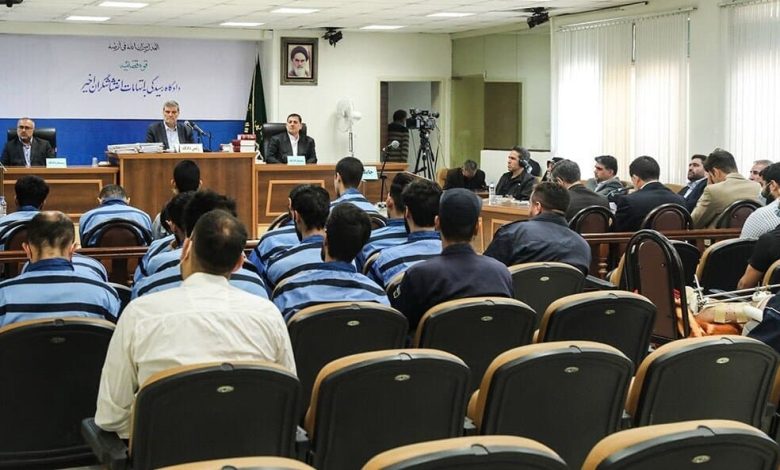Failed in Quashing Iran Protests, Clerical Regime Sentences Arrested Protesters to Death

Written by
Mehdi Oghbai
In recent days, the Iranian regime’s officials have made threats against protesters in a bid to quash protests. After threats made by the Revolutionary Guards (IRGC) commander, Hossein Salami, the regime’s judiciary sentenced six arrested protesters to execution.
On Saturday, Iran’s state media announced that the indictment of 1095 of the uprising’s arrestees is ready in at least seven cities, and the trial of 315 of them has begun in a court in Tehran, presided by the infamous Abolqasem Salavati. Salavati has issued many death sentences for arrested protesters and dissidents in recent years.
“With the order of the Judiciary chief, following the indictment of the recent riots’ defendants, the trials to determine these cases began last week. So far, the indictments issued include those for 25 cases in Kerman, 89 in Semnan, 119 in Zanjan, 105 in Khuzestan, 55 in Qazvin, 110 in Kurdistan, 315 in Tehran, and 201 in Alborz provinces,” the state-run Dideban website wrote on October 29.
The first round of these kangaroo trials was held on October 29 while denying arrested protesters from having access to their lawyers or contacting their family members. “Mohammad Ghobadlou, son of Mohammad Ali, is accused of corruption on earth. Saman Seyedi, son of Teymoor, is accused of Moharebeh [waging war on God]. Abolfazl Mehri-Hossein Haji Lou, son of Vali, is accused of confronting the Islamic state. Mohsen Rezazadeh, son of Hassan, is accused of Moharebeh. Said Shirazi, son of Alireza, is accused of corruption, and Mohammad Broghani, son of Hossein, is accused of Moharebeh,” the state-run Sobh-e Emrooz on October 29.
The Iranian regime uses Moharebeh, and Corruption on earth, to convict dissidents. These charges meet capital punishments, mostly executions.
Brief on Iran’s nationwide uprising
November 2, 2022
The Foreign Affairs Committee of the National Council of Resistance of Iran (NCRI)#IranRevolution2022 #IranProtests2022
#آزادی_آزادی_آزادی pic.twitter.com/CBc6jJfl6j— NCRI-FAC (@iran_policy) November 3, 2022
In another desperate attempt to intimidate and quell Iran’s volatile society, the regime’s judiciary sentenced Abbas Darris, who was arrested during the 2019 uprising, to execution. Darris, who witnessed the regime’s massacre in the marshes of Mahshahr in southern Iran, is falsely accused of killing a police officer. He was tortured, and the regime extracted forced confessions from him after days of torture. He later rejected the accusations in court. Abbas Darris’s wife, Kafayeh Jorbavi, died of a stroke last year under the immense psychological and living pressure of having her husband on death row.
During November 2019 uprising, the regime’s security forces killed 1500 protesters. At least a hundred were killed in marshes in Mahshahr, where the regime’s security forces used heavy machine guns, opening fire on unarmed protesters hiding in the marshes.
The Iranian people have shown their determination to topple the regime at any cost. According to the Iranian opposition, the Mujahedin-e Khalq (MEK) organization, so far, over 450 protesters have been killed, and roughly 25,000 have been arrested.
Failing miserably to quell Iran’s restive society, the ruling theocracy has resorted to violence, declaring a full-fledged war on the people. The unlawful and kangaroo trials of the uprising’s arrestees are part of the regime’s desperate attempt to spread fear to prevent widespread protests.
The world community should immediately react and condemn the regime’s ongoing human rights violations and recognize the Iranian people’s right to self-defense as the only way to end the regime’s decades-long impunity and break the cycle of violence in Iran under the mullahs’ regime.
Failed in Quashing Iran Protests, Clerical Regime Sentences Arrested Protesters to Death

